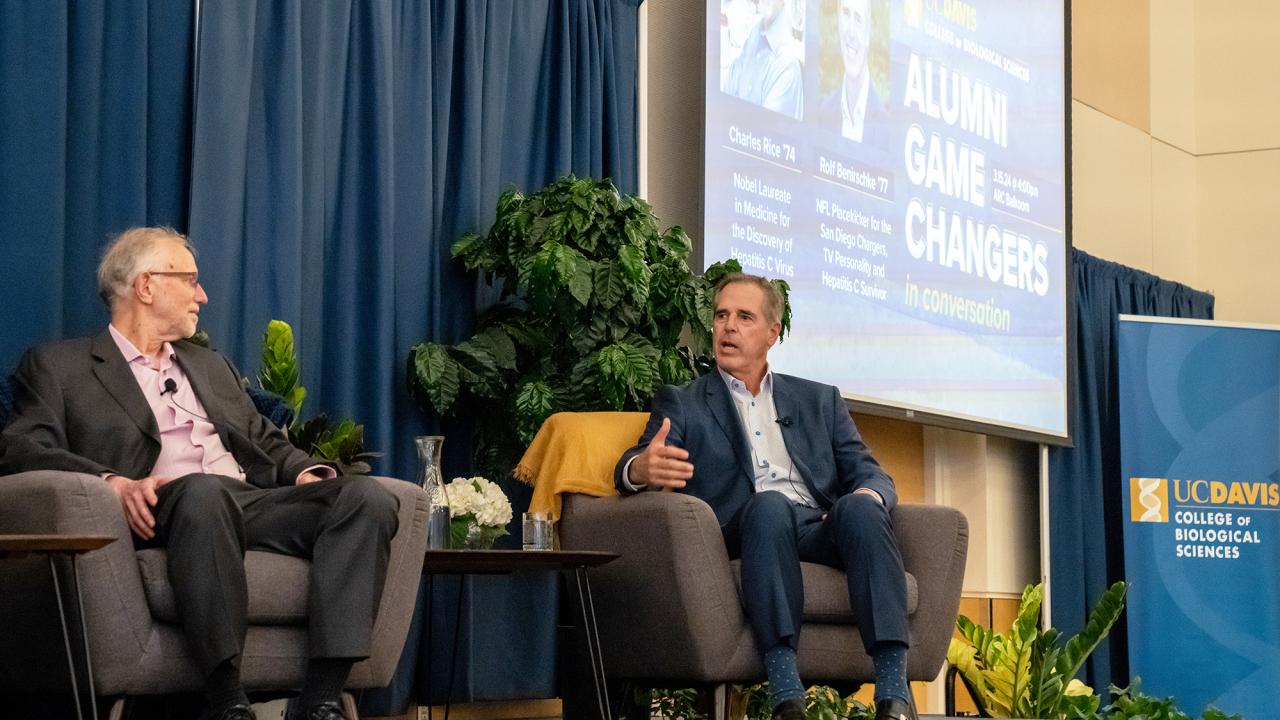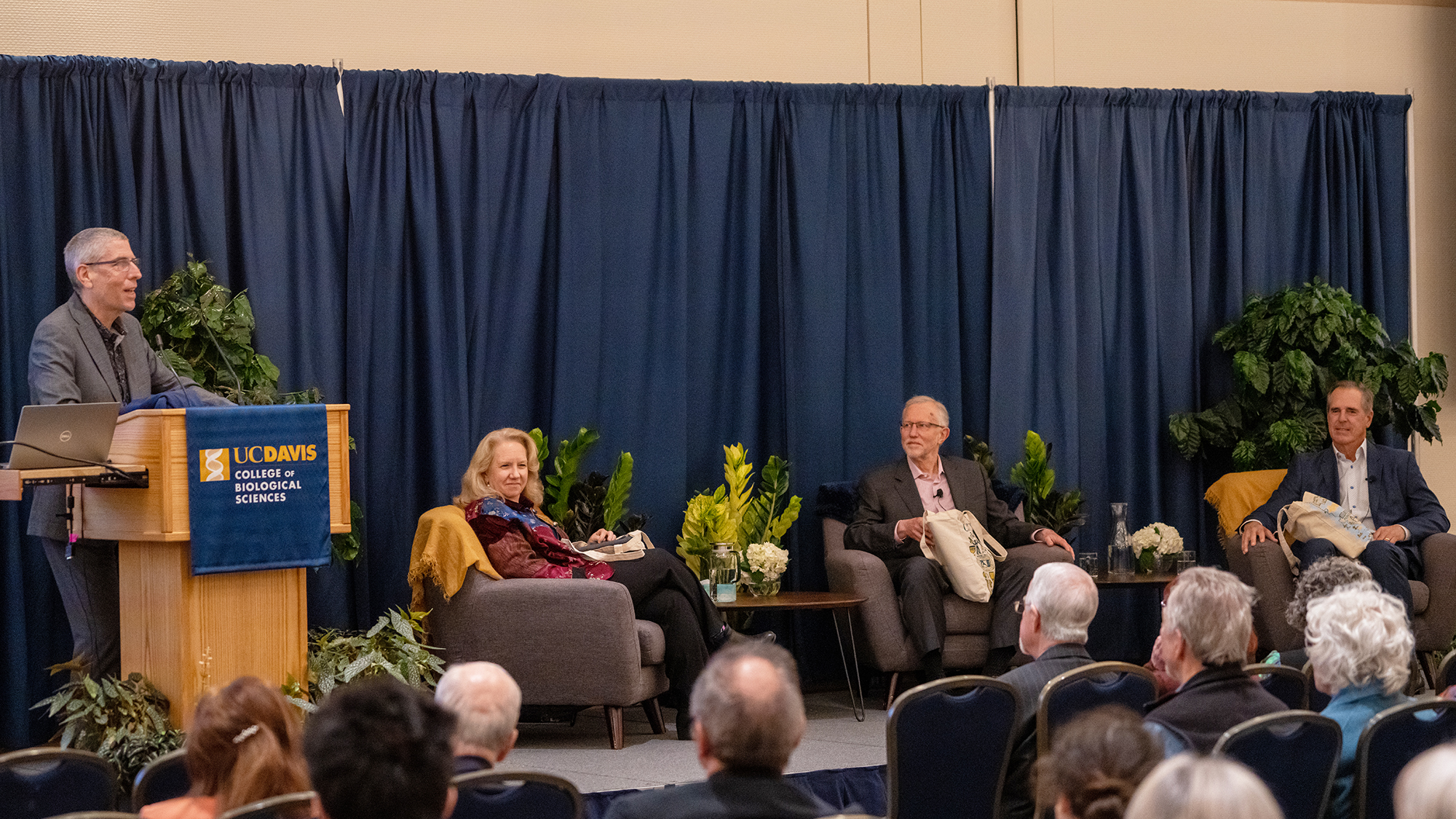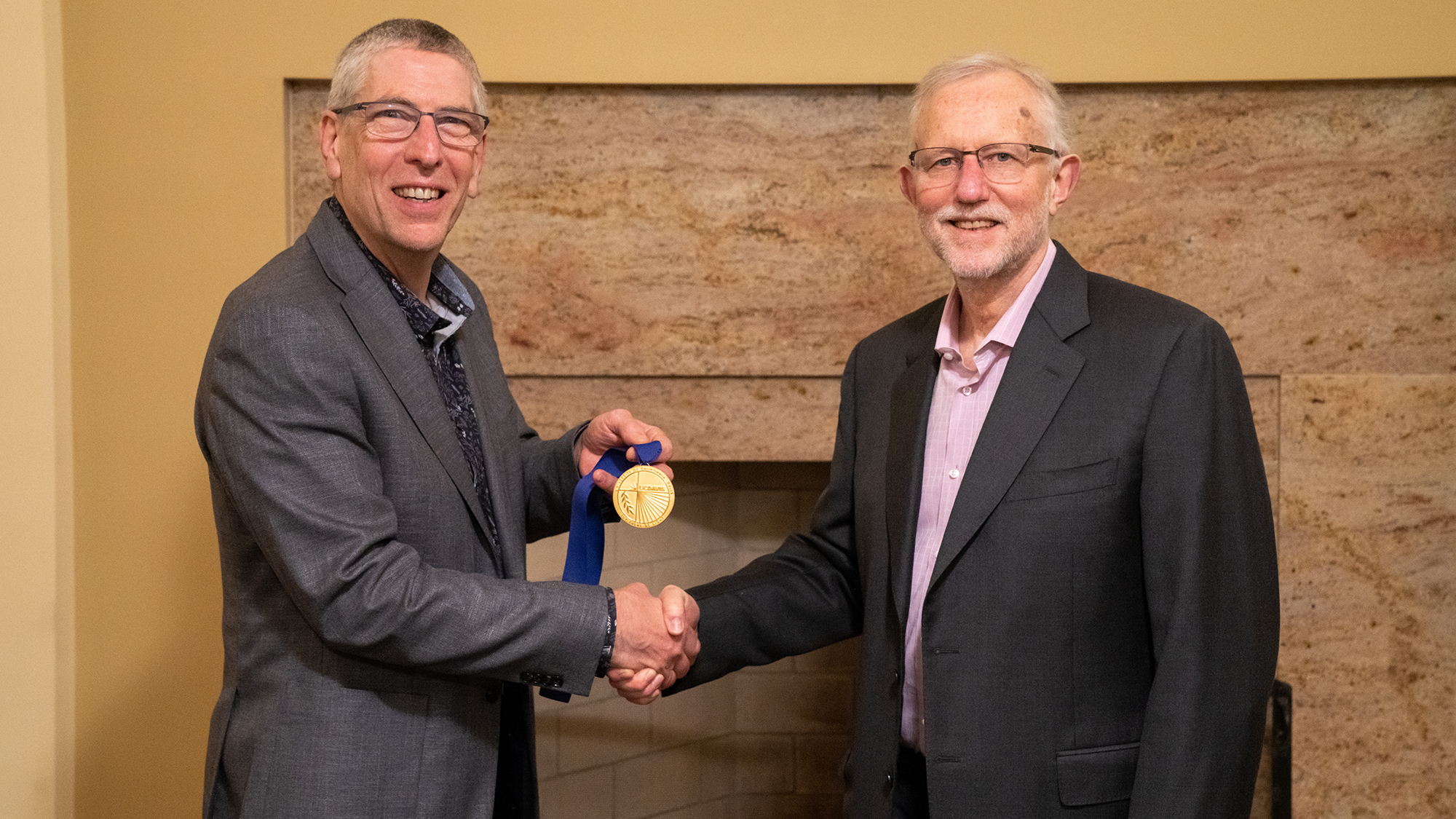
Field Goals and Breakthroughs: A Nobel Laureate and an NFL Star’s Unlikely Connection
At first glance, it might seem odd to find a former NFL kicker and a Nobel laureate sharing a stage. But Rolf Benirschke ‘77 and Charles Rice ‘74 have an unusual—and unusually consequential—bond: Benirschke is a survivor of Hepatitis C, and Rice’s research on the virus led to the cure that saved him. Rice was also awarded the 2021 UC Davis Medal, the university’s highest honor, in recognition of his research, which was presented to him at a dinner following the onstage event.
Benirschke and Rice share other commonalities. Both are UC Davis alumni who majored in zoology (now called evolution, ecology and biodiversity) and on Friday, March 15 they met on campus to discuss their shared Aggie histories and the scientific breakthroughs that connected them. During their conversation, which was moderated by Provost and Executive Vice Chancellor Mary Croughan, both described their years at UC Davis as formative.
Two very different paths converge
Rice, now the Maurice R. and Corinne P. Greenberg Professor in Virology at The Rockefeller University, New York, says he was heavily influenced by an introductory course in biology, taught by Dennis Barrett, a marine biologist who became a mentor and encouraged Rice to take a summer research course in marine biology. “That was the first time that I was really completely immersed in research and lectures by really some fantastic scientists,” says Rice. “It was a transcendent experience.”

After graduating from UC Davis, Rice studied virology at CalTech. He began his groundbreaking work on the Hepatitis C vaccine in 1989, and it took more than 10 years to discover the complete genome sequence of the virus—a discovery that led to the cure for the disease, and to the 2020 Nobel Prize in physiology or medicine for Rice and his colleagues.
It also eventually led to his conversation with Benirschke, who saw the news of Rice’s achievement in a UC Davis newsletter and contacted Mark Winey, dean of the College of Biological Sciences, which houses today’s equivalent of the zoology major, and asked to be connected to the man who helped cure him after a years-long medical ordeal.
That ordeal overlapped with a successful NFL career as a kicker, though Benirschke never intended to play football. He “grew up in a lab,” he said, with a German scientist for a father, but as a high school athlete focused on soccer, he got recruited to the football team to kick. At his father’s request, he turned down football scholarships at USC and Stanford, and attended UC Davis to study biology—but Davis’s football team had no kicker, and the coach heard about Benirschke, called him in his dorm room, and invited him to play.
When he finished his four years as a student athlete at Davis, he had been accepted for graduate school at Cornell—but instead he was drafted to the NFL by the Oakland Raiders, who had just won the Super Bowl. “My dad was horrified,” said Benirschke with a chuckle. “Having his middle son in the NFL was huge disappointment to my father, who was this renowned scientist.”
Despite his father’s skepticism, Benirschke enjoyed a successful NFL career and when he retired from the San Diego Chargers he was the third most accurate kicker in NFL history. His playing years, however, were was interrupted by a life-threatening bout of Crohn’s disease, which led to hospitalizations, surgeries and the blood transfusion from which he contracted Hepatitis C.

Decades later, Benirschke endured grueling, year-long clinical trials with painful daily injections in attempt to cure the disease—all unsuccessful, until he received a drug called Pegasys, made by Roche and based on Rice’s research. (In a special twist, a classmate of Benirschke’s, Mark Noguchi ‘77, who works for Roche was in the audience for the March 15 conversation.)
“I was cured because this guy spent 10 years chasing a virus,” said Benirschke, whose voice quavered as he gestured toward Rice. “Now 98 percent of patients with Hepatitis C are cured with a pill. That’s because of this man, and he deserves the Nobel Prize. That’s science.”
The lifelong influence of UC Davis
After both Rice and Benirschke shared their personal history and connection with the audience, the conversation turned to other matters, including rapid-fire questions from Croughan about the duo’s most memorable days on campus and favorite places in Davis. The latter prompted reminiscences about their freshman dorms and friends made there (several of whom were in the audience), the building that housed introductory chemistry lectures, and a brief discussion of the late, lamented watering hole The Graduate; Croughan recalled it was “packed every night” and had “one of the best burgers you ever had in your life,” and Rice chimed in recalling its air hockey tables.
Before taking questions from the audience, Croughan also asked Benirschke and Rice about the most important lessons each took from his time on campus and life after, and what they would share with students today.
Benirschke answered with “good news and bad news,” he said. “My life was as unplanned as it could be, so the bad news is whatever plans you’re making, I’m guessing they’re not going to work out the way you’re planning. The good news is if you’re curious and follow things that are important to you, you’re going to have an extraordinary life. It really is about finding your passion.”
Rice, concurring, jumped in. “As a scientist, I’ve been really fortunate to do something that I would choose to be doing regardless,” he said. “If you can find something that captures you like that, it’s a wonderful way to live your life.”
With Benirschke nodding in agreement, Rice went on to link his later career to his time on campus 50 years ago. “That spirit of passion, hard work, tenacity, and exploration for me was an aspect of being at UC Davis,” he said. “I think what really defined me was coming to UC Davis.”
Media Resources
- Kate Washington, Ph.D., is a freelance writer based in Sacramento and the author of Already Toast: Caregiving and Burnout in America. Her work has appeared in the New York Times, TIME and Sunset, among other publications.